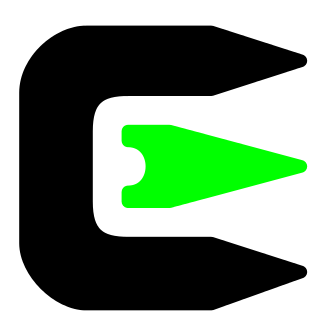
Cygwin is a Unix-like environment and command-line interface for Microsoft Windows.

LaTeX is a software system for typesetting documents. LaTeX markup describes the content and layout of the document, as opposed to the formatted text found in WYSIWYG word processors like Microsoft Word, LibreOffice Writer and Apple Pages. The writer uses markup tagging conventions to define the general structure of a document, to stylise text throughout a document, and to add citations and cross-references. A TeX distribution such as TeX Live or MiKTeX is used to produce an output file suitable for printing or digital distribution.
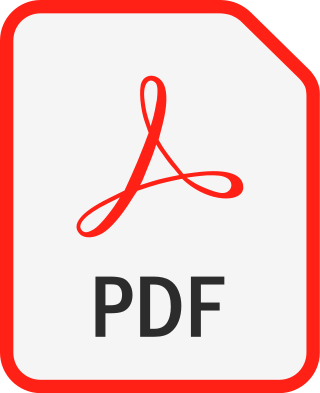
Portable Document Format (PDF), standardized as ISO 32000, is a file format developed by Adobe in 1992 to present documents, including text formatting and images, in a manner independent of application software, hardware, and operating systems. Based on the PostScript language, each PDF file encapsulates a complete description of a fixed-layout flat document, including the text, fonts, vector graphics, raster images and other information needed to display it. PDF has its roots in "The Camelot Project" initiated by Adobe co-founder John Warnock in 1991. PDF was standardized as ISO 32000 in 2008. The last edition as ISO 32000-2:2020 was published in December 2020.
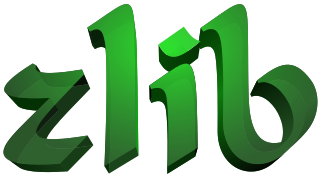
zlib is a software library used for data compression as well as a data format. zlib was written by Jean-loup Gailly and Mark Adler and is an abstraction of the DEFLATE compression algorithm used in their gzip file compression program. zlib is also a crucial component of many software platforms, including Linux, macOS, and iOS. It has also been used in gaming consoles such as the PlayStation 4, PlayStation 3, Wii U, Wii, Xbox One and Xbox 360.
In computing, the utility diff is a data comparison tool that computes and displays the differences between the contents of files. Unlike edit distance notions used for other purposes, diff is line-oriented rather than character-oriented, but it is like Levenshtein distance in that it tries to determine the smallest set of deletions and insertions to create one file from the other. The utility displays the changes in one of several standard formats, such that both humans or computers can parse the changes, and use them for patching.

The GNU Autotools, also known as the GNU Build System, is a suite of programming tools designed to assist in making source code packages portable to many Unix-like systems.

The GNU Project is a free software, mass collaboration project announced by Richard Stallman on September 27, 1983. Its goal is to give computer users freedom and control in their use of their computers and computing devices by collaboratively developing and publishing software that gives everyone the rights to freely run the software, copy and distribute it, study it, and modify it. GNU software grants these rights in its license.

Texinfo is a typesetting syntax used for generating documentation in both on-line and printed form with a single source file. It is implemented by a computer program released as free software of the same name, created and made available by the GNU Project from the Free Software Foundation.

Doxygen is a documentation generator and static analysis tool for software source trees. When used as a documentation generator, Doxygen extracts information from specially-formatted comments within the code. When used for analysis, Doxygen uses its parse tree to generate diagrams and charts of the code structure. Doxygen can cross reference documentation and code, so that the reader of a document can easily refer to the actual code.

Graphviz is a package of open-source tools initiated by AT&T Labs Research for drawing graphs specified in DOT language scripts having the file name extension "gv". It also provides libraries for software applications to use the tools. Graphviz is free software licensed under the Eclipse Public License.

Scanner Access Now Easy (SANE) is an open-source application programming interface (API) that provides standardized access to any raster image scanner hardware. The SANE API is public domain. It is commonly used on Linux.
AppImage is an open-source format for distributing portable software on Linux. It aims to allow the installation of binary software independently of specific Linux distributions, a concept often referred to as upstream packaging. As a result, one AppImage can be installed and run across Ubuntu, Arch Linux, and Red Hat Enterprise Linux without needing to use different files. It aims to be a format that's self-contained, rootless, and independent of the underlying Linux distribution.
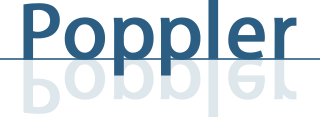
Poppler is a free software utility library for rendering Portable Document Format (PDF) documents. Its development is supported by freedesktop.org. It is commonly used on Linux systems, and is used by the PDF viewers of the open source GNOME and KDE desktop environments.

PeaZip is a free and open-source file manager and file archiver for Microsoft Windows, ReactOS, Linux, MacOS and BSD by Giorgio Tani. It supports its native PEA archive format and other mainstream formats, with special focus on handling open formats. Version 9.4.0 supported 234 file extensions.

Sumatra PDF is a free and open-source document viewer that supports many document formats including: Portable Document Format (PDF), Microsoft Compiled HTML Help (CHM), DjVu, EPUB, FictionBook (FB2), MOBI, PRC, Open XML Paper Specification, and Comic Book Archive file. If Ghostscript is installed, it supports PostScript files. It is developed exclusively for Microsoft Windows.

PSPP is a free software application for analysis of sampled data, intended as a free alternative for IBM SPSS Statistics. It has a graphical user interface and conventional command-line interface. It is written in C and uses GNU Scientific Library for its mathematical routines. The name has "no official acronymic expansion".

The GNU General Public License is a series of widely used free software licenses or copyleft that guarantee end users the four freedoms to run, study, share, and modify the software. The license was the first copyleft for general use and was originally written by Richard Stallman, the founder of the Free Software Foundation (FSF), for the GNU Project. The license grants the recipients of a computer program the rights of the Free Software Definition. These GPL series are all copyleft licenses, which means that any derivative work must be distributed under the same or equivalent license terms. It is more restrictive than the Lesser General Public License and even further distinct from the more widely used permissive software licenses BSD, MIT, and Apache.
XZ Utils is a set of free software command-line lossless data compressors, including the programs lzma and xz, for Unix-like operating systems and, from version 5.0 onwards, Microsoft Windows. For compression/decompression the Lempel–Ziv–Markov chain algorithm (LZMA) is used. XZ Utils started as a Unix port of Igor Pavlov's LZMA-SDK that has been adapted to fit seamlessly into Unix environments and their usual structure and behavior.
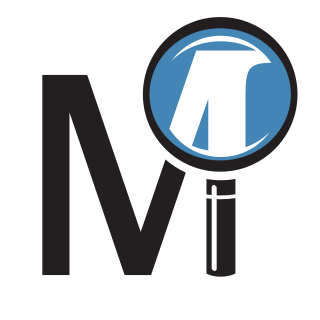
MuPDF is a free and open-source software framework written in C that implements a PDF, XPS, and EPUB parsing and rendering engine. It is used primarily to render pages into bitmaps, but also provides support for other operations such as searching and listing the table of contents and hyperlinks.

LibreCAD is a computer-aided design (CAD) application for 2D design. It is free and open-source, and available for Linux, macOS, and Windows operating systems.













